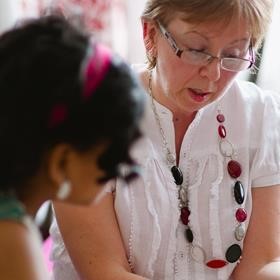ADAPT: Neglect
We’re working with 11 FNP sites from around the country and Dartington Service Design Lab to co-design a number of adaptations to the FNP programme which we will put through rapid-cycle testing. The ADAPT project (Accelerated Design and Rapid Programme Testing), is part of the wider FNP Next Steps programme.
In the eighth of our clinical adaptations blog series, Rachel Berry, from the Portsmouth team, outlines the adaptation they’re developing. Their focus is on raising awareness and creating better understanding of neglect.
Nationally, neglect is the reason behind 60% of all child protection plans while, here in Portsmouth, it’s 70%. We wanted to do something about this, so chose to focus our adaptation on increasing awareness of neglect among our clients and enabling early detection of neglectful behavior. Through improving knowledge and developing new tools and resources we’re aiming to reduce the number of children who are referred to social care in Portsmouth because of neglect.
Our adaption has involved the development of a revised approach to how we tackle neglect, which brings together a number of new neglect- and parenting-themed activities, with existing relevant FNP facilitators and the use of the NSPCC Graded Care 2 Profile (GCP2), an assessment tool to identify neglect and highlight parent’s strengths, weaknesses and what needs to be changed and support planning around change as a collaborative approach.
The newly-developed activities have proven to be the most successful, and have included elements that we didn’t anticipate would engage clients so effectively. The neglect activity has really helped clients to understand how their own childhood experiences might have impacted their lives, while the parenting activity has allowed them to explore and discuss experiences of parenting and how the way they were brought up might affect their own approach to parenting. The neglect facilitators have dovetailed these activities well and overall we have seen positive engagement from clients.
By trialing the new tools the team has also been able to evaluate at what stage of the clients’ journey they have been best received. Seemingly, it is during pregnancy that the new activities and facilitators have really opened up conversations and helped us to raise awareness of these crucial issues.
Clients have been an integral part of trialing our adaptation and we have really valued their honesty in what works and what doesn’t and the relevance the tools have to them as parents. We have taken both positive and negative feedback from the activities which has allowed us to shape and form ‘how and when’ we have delivered this work. This also has been fed back through the client focus groups with the Dartington Social Design Lab, which has provided us with further valuable learning from a range of clients with different backgrounds and experiences. It has allowed us to better understand and learn how to adapt to individual client needs.
The use of all these tools has helped change the practice of nurses, allowing them to work with the clients on a deeper level. The team has embraced the adaptation with enthusiasm and commitment but there have, of course, been some challenges along the way: nurses have had to get to grips with using the new data collection system (FADS); be creative how they’ve engaged clients in trialing the new tools; and had to think carefully about how they approach difficult conversations with clients around specific issues in a more individual and personalised way. The success we’ve had on the adaptation to date is down to the nurses’ skills in engagement and building positive relationships with their clients.
We hope that by addressing neglect as a standalone area we can reduce the numbers of children moving into tier four social care and, in turn, improve outcomes for children and their families. Furthermore, by reducing the number of FNP clients being referred to social care, we can support them to be more self-reliant and, where feasible, work with them to graduate early from FNP.
We also believe that this work can provide further learning and best practice for the wider local workforce and will help us to further reduce levels of child neglect in Portsmouth.
